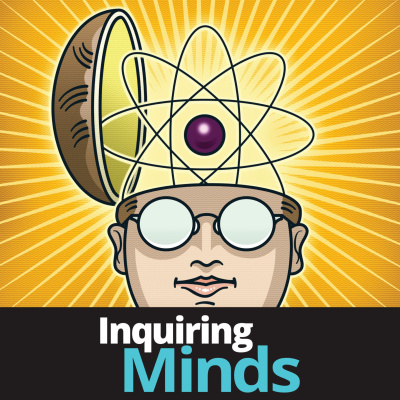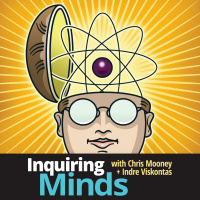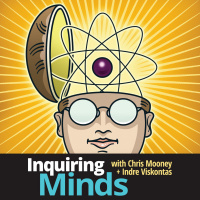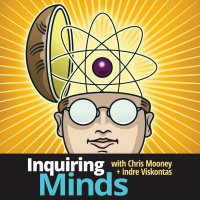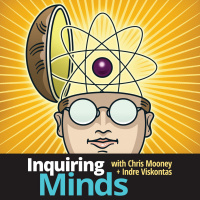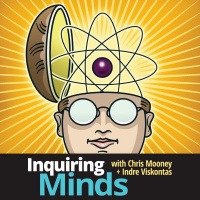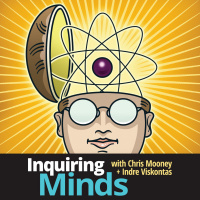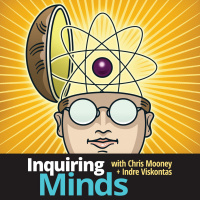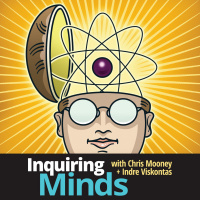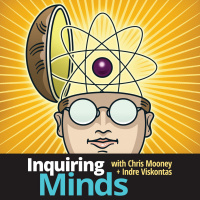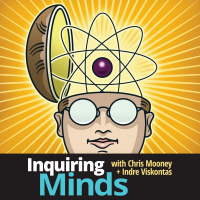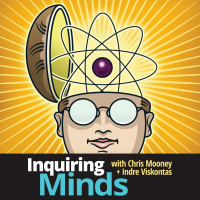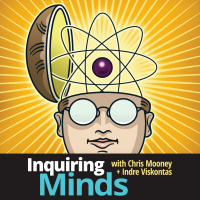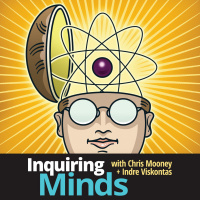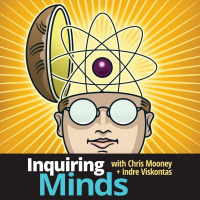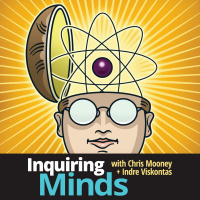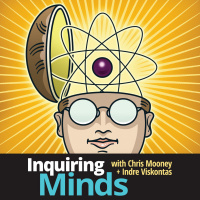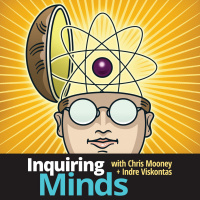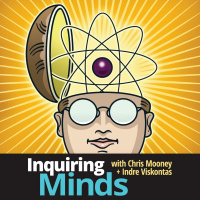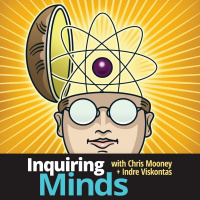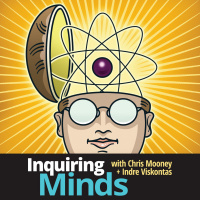Sinopsis
Each week Inquiring Minds brings you a new, in-depth exploration of the place where science, politics, and society collide. Were committed to the idea that making an effort to understand the world around you though science and critical thinking can benefit everyoneand lead to better decisions. We endeavor to find out whats true, whats left to discover, and why it all matters with weekly coverage of the latest headlines and probing discussions with leading scientists and thinkers. Produced in partnership with Climate Desk, a journalistic collaboration dedicated to exploring the impact of a changing climate and consisting of The Atlantic, Center for Investigative Reporting, Grist, The Guardian, Mother Jones, Slate, and Wired.
Episodios
-
41 Amy Stewart - The Science Behind the World's Alcohol
04/07/2014 Duración: 48minIt's the 4th of July, and you love your country. Your likely next step: Fire off some small scale explosives, and drink a lot of beer.But that last word ought to trouble you a little. Beer? Is that really the best you can do? Isn't it a little, er, uncreative?Amy Stewart, our guest this week, has some better ideas for you. Author of the New York Times bestselling book The Drunken Botanist: The Plants That Create The World's Great Drinks, she's a master of the wild diversity of ways in which, since time immemorial, human civilizations (virtually all of them) have created alcoholic drinks from the sugars of their native plants.It seems human beings pretty much always find a way when it comes to getting hammered. Indeed, when you think about it, you can argue that learning how to do so was one of the first human sciences. In a sense, it's closely akin to capturing and using solar energy: Making alcohol, too, hinges upon tapping into the power created by the sun. "It is not much of an exaggeration to claim t
-
40 Zach Weinersmith - Baby Catapulting and Other Great Terrible Hypotheses
27/06/2014 Duración: 57minThere's nothing quite as satisfying as a really good joke. Someone has made a clever new connection between two mundane things that we've all encountered—and suddenly we have a lovely "aha" moment. We find it funny.That sense of revelation accompanying a good joke or comic is very similar to what many scientists experience when they finally figure out a great explanation for some kind of previously unknown phenomenon. But don't take it from us. Take it from the scientifically-trained author and illustrator Zach Weinersmith (née Weiner), creator of the popular webcomic Saturday Morning Breakfast Cereal (SMBC), known for its science-themed humor."I suspect what's actually going on with people who are thought of as very creative is they're good at two skills, one of which is generating connections rapidly, and two, editing out the garbage quickly," explains Weinersmith on this week's episode.In Weinersmith's case, some of funniest jokes are actually about just plain bad scientific thinking—an
-
39 Jordan Ellenberg - Why Math Is The Ultimate BS Detector
20/06/2014 Duración: 48minChances are that when you think about math—which, for most of us, happens pretty infrequently—you don't think of it in anything like the way that Jordan Ellenberg does. Ellenberg is a rare scholar who is both a math professor (at the University of Wisconsin-Madison) and a novelist. And in his fascinating new book, How Not to Be Wrong: The Power of Mathematical Thinking, he deploys analyses of poetry, politics, and even religion in a bold recasting of what math is in the first place.For Ellenberg, the stuff you hated about math in high school isn't the core of the thing. He's emphatic that mathematics isn't simply about the calculations involving, you know, numbers; rather, it's a highly nuanced approach to solving problems that we all, unavoidably, encounter. Ellenberg's chapters range from showing how mathematical thinking undermines many popular proofs for the existence of God (Paley's design argument, Pascal's wager), to explaining how math helps us understand why smoking causes lung cancer (contrary to cl
-
38 Sam Kean - These Brains Changed Neuroscience Forever
13/06/2014 Duración: 57minWe've all been mesmerized by them—those beautiful brain scan images that make us feel like we're on the cutting edge of scientifically decoding how we think. But as soon as one neuroscience study purports to show which brain region lights up when we are enjoying Coca-Cola, or looking at cute puppies, or thinking we have souls, some other expert claims "it's just a correlation," and you wonder whether researchers will ever get it right.But there's another approach to understanding how our minds work. In his new book The Tale of the Dueling Neurosurgeons, Sam Kean tells the story of a handful of patients whose unique brains—rendered that way by surgical procedures and unfortunate, freak accidents—taught us much more than any set of colorful scans. Kean recounts some of their unforgettable stories on this week’s episode."As I was reading these [case studies] I said, 'That's baloney! There's no way that can possibly be true,'" Kean remembers, referring to one particularly surprising case in wh
-
37 Raychelle Burks - Zombie Repellent and Other Awesome Uses for Chemistry
05/06/2014 Duración: 01h27sRemember those stick-figures of chemical compounds you were forced to memorize in high school? Remember how useless it seemed at the time? Can you still articulate the difference between a covalent bond and an ionic one (without checking Wikipedia)? If not, pay attention: You might be caught flat-footed during the zombie apocalypse.The CDC suggests (half-seriously) having a zombie-preparedness kit (after all, it would also be useful in case of pandemics and hurricanes). But chemist and blogger Raychelle Burks has a simpler solution—one that would have greatly de-grossified a famous scene from The Walking Dead, in which Rick and his fellow apocalypse survivors slathered the guts of dead humans all over themselves, to jam the zombies' chemosenses with the smell of rotting flesh and thereby, escape."They used chemical camouflage," explains Burks, to trick the zombies into thinking they were fellow undead. The only problem: Icky and dangerous exposure to blood, guts, and pathogens. Burks has a better id
-
36 Harry Collins - Why Googling Doesn't Make You a Scientific Expert
30/05/2014 Duración: 54minRemember "Climategate"? It was the 2009 non-scandal scandal in which a trove of climate scientists' emails, pilfered from the University of East Anglia in the UK, were used to call all of modern climate research into question. Why? Largely because a cursory reading of those emails—showing climate scientists frankly discussing how to respond to burdensome data requests and attacks on their work, among other content—showed a side of researchers that most people aren't really used to seeing. Suddenly, these "experts" looked more like ordinary human beings who speak their minds, who sometimes have emotions and rivalries with one another, and (shocker) don't really like people who question the validity of their knowledge.In other words, Climategate demonstrated something that sociologists of science, or those in the so-called field of "science studies," have know for some time—that scientists are mortals, just like all the rest of us. "What was being exposed was not something spe
-
35 Richard Alley - West Antarctica Is Melting and We Can't Stop It
22/05/2014 Duración: 55minIf you want to truly grasp the scale of the Earth's polar ice sheets, you need some help from Isaac Newton. Newton taught us the universal law of gravitation, which states that all objects are attracted to one another in proportion to their masses (and the distance between them). The ice sheets covering Antarctica and Greenland are incredibly massive—Antarctica's ice is more than two miles thick in places and 5.4 million square miles in extent. These ice sheets are so large, in fact, that gravitational attraction pulls the surrounding ocean towards them. The sea level therefore rises upward at an angle as you approach an ice sheet, and slopes downward and away as you leave its presence.This is not good news for humanity. As the ice sheets melt due to global warming, not only do they raise the sea level directly; they also exert a smaller gravitational pull on the surrounding ocean. So water sloshes back towards the continents, where we all live. "If Antarctica shrinks and puts that water in the ocean, th
-
34 John Oliver - This World Will Be a Ball of Fire Before It Stops Being Funny
15/05/2014 Duración: 46minIn late April, former Daily Show correspondent John Oliver kicked off his HBO news-satire program, Last Week Tonight. Oliver, who spent nearly eight years at The Daily Show and has a solid background in political satire, is off to a good start. His weekly series—which offers biting commentary on the past week's biggest news stories, both national and international—is barely into its inaugural season, and it seems to be hitting the right notes. The premiere episode, for example, featured an exclusive televised interview with Gen. Keith Alexander (Ret.), his first since stepping down as director of the National Security Agency.In another recent episode, Oliver expressed his frustration with the so-called climate "debate" in America by staging a more representative debate between a few climate skeptics and nearly a hundred scientists. One of the guys on the correct side of the "debate" was Bill Nye, who was booked for the show basically at the last minute."We just wanted to really play w
-
33 David Amodio - The Science of Prejudice
09/05/2014 Duración: 01h59sWhen the audio of LA Clippers owner Donald Sterling telling his girlfriend not to "bring black people" to his team's games hit the Internet, the condemnations were immediate. It was clear to all that Sterling was a racist, and the punishment was swift: the NBA banned him for life. It was, you might say, a pretty straightforward case.When you take a look at the emerging science of what motivates people to behave in a racist or prejudiced way, though, matters quickly grow complicated. In fact, if there's one cornerstone finding when it comes to the psychological underpinnings of prejudice, it's that actual out-and-out or "explicit" racists—like Sterling—are just one part of the story. Perhaps far more common are cases of so-called "implicit" prejudice, where people harbor subconscious biases, of which they may not even be aware, but that come out in controlled psychology experiments.Much of the time, these are not the sort of people whom we would normally think of as racists. "
-
32 Katharine Hayhoe - Climate Science and Christianity
02/05/2014 Duración: 49minClimate scientist Katharine Hayhoe, an evangelical Christian, has had quite the run lately. A few weeks back, she was featured in the first episode of the Showtime series The Years of Living Dangerously, meeting with actor Don Cheadle in her home state of Texas to explain to him why faith and a warming planet aren't in conflict. Then, Time magazine named her one of the 100 most influential people of 2014; Cheadle wrote the entry.Why is Hayhoe in the spotlight? Simply put, 25 to 30 percent of Americans are evangelical Christians, and their belief in the science of global warming is well below the national average. And if anyone has a chance of reaching this vast and important audience, Hayhoe does. "I feel like the conservative community, the evangelical community, and many other Christian communities, I feel like we have been lied to," explains Hayhoe on this week’s episode. "We have been given information about climate change that is not true. We have been told that it is incompatible with our
-
31 Mary Roach - The Science of Your Guts
25/04/2014 Duración: 48minMary Roach has been called "America's funniest science writer." Master of the monosyllabically titled bestseller, she has explored sex in Bonk, corpses in Stiff, and the afterlife in Spook. Her latest book, now out in paperback, is Gulp: Adventures on the Alimentary Canal. It's, you know, completely gross. But in a way that you can't put down.What kind of things might you learn in a Mary Roach book about the alimentary canal, that convoluted pipeline that runs from where you food goes in all the way to where something else comes out? Well, how about why suicide bombers don't carry bombs in their rectums: Their bodies would absorb much of the explosion and prevent any chance of achieving their deadly objective. It's one of the "reasons to be thankful for your anus," observes Roach on this week's episode.On the show, Roach took host Indre Viskontas on a quick tour of the colon and discussed some uses of the alimentary canal that are surely outside the normal range of advised behavior (just G
-
30 Jared Diamond - The Third Chimpanzee
18/04/2014 Duración: 51minJared Diamond, author of a suite of massive, bestselling books about the precarious state of our civilization (including the Pulitzer-winning Guns, Germs, and Steel), calls himself "cautiously optimistic" about the future of humanity. What does that mean? "My estimate of our chances that we will master our problems and have a happy future, I would say the chances are 51 percent," Diamond explains on this week’s episode. "And the chances of a bad ending are only 49 percent," he adds.Diamond didn't start out as the globe-romping author, prognosticator, and polymath whose books—kind of like those of Stephen Hawking—we feel like we have to have read in order to feel moderately intelligent. Rather, after a Cambridge training in physiology, Diamond at first embarked on a career in medical research. By the mid-1980s, he had become recognized as the world's foremost expert on, of all things, the transport of sodium in the human gall bladder. But then in 1987, something happened: his twin
-
29 Neil Shubin - Your Inner Fish
10/04/2014 Duración: 43minWe all know the Darwin fish, the clever car-bumper parody of the Christian "ichthys" symbol, or Jesus fish. Unlike the Christian symbol, the Darwin fish has, you know, legs. Har har.But the Darwin fish isn't merely a clever joke; in effect, it contains a testable scientific prediction. If evolution is true, and if life on Earth originated in the oceans, then there must have once been fish species possessing primitive limbs, which enabled them to spend some part of their lives on land. And these species, in turn, must be the ancestors of four-limbed, land-living vertebrates like us.Sure enough, in 2006, scientists found one of those transitional species: Tiktaalik roseae, a 375 million-year-old Devonian period specimen discovered in the Canadian Arctic by paleontologist Neil Shubin and his colleagues. Tiktaalik, explains Shubin this week’s episode, is an "anatomical mix between fish and a land-living animal.""It has a neck," says Shubin, a professor at the University of Chicago. &
-
28 John Hibbing - The Biology of Ideology
04/04/2014 Duración: 45minThomas Jefferson was a smart dude. And in one of his letters to John Adams, dated June 27, 1813, Jefferson made an observation about the nature of politics that science is only now, two centuries later, beginning to confirm. "The same political parties which now agitate the United States, have existed through all time," wrote Jefferson. "The terms of Whig and Tory belong to natural, as well as to civil history," he later added. "They denote the temper and constitution of mind of different individuals."Tories were the British conservatives of Jefferson's day, and Whigs were the British liberals. What Jefferson was saying, then, was that whether you call yourself a Whig or a Tory has as much to do with your psychology or disposition as it has to do with your ideas. At the same time, Jefferson was also suggesting that there's something pretty fundamental and basic about Whigs (liberals) and Tories (conservatives), such that the two basic political factions seem to appear again and a
-
27 Ethan Perlstein - Scenes from the Postdocalypse
28/03/2014 Duración: 54minHow do you become a scientist? Ask anyone in the profession and you'll probably hear some version of the following: get a Bachelor's of Science degree, work in a lab, get into a PhD program, publish some papers, get a good post-doctoral position, publish some more papers and then apply for a tenure-track job at a large university. It's a long road—and you get to spend those 10 to 15 years as a poor graduate student or underpaid postdoc, while you watch your peers launch careers, start families, and contribute to their 401(k) plans.And then comes the academic job market. According to Brandeis University biochemist Dr. Gregory Petsko, who recently chaired a National Academy of Sciences committee on the postdoctoral experience in the US, less than 20 percent of aspiring postdocs today get highly coveted jobs in academia. That's less than one in five. Naturally, many more end up in industry, in government, and in many other sectors—but not the one they were trained for or probably hoping for. "We're fond of
-
26 Phil Plait - Just After the Big Bang
21/03/2014 Duración: 51minWe all heard the cosmos-stretching news this week. On Monday, a team of researchers working with a special telescope at the South Pole confirmed that they had observed evidence of "inflation," the sudden and rapid expansion of the universe that occurred in an unimaginably small slice of time just after the Big Bang, the beginning of space and time some 13.8 billion years ago. The researchers achieved this feat by examining what is known as the cosmic microwave background or CMB, which has been called the "residual heat of creation." It is a light glow that suffuses the universe and that is nearly as old as the Big Bang itself—its leftover radiation and, you might say, its signature. For most of us, though, all this talk of "inflation"—which quickly gets even more complicated, with phrases like "gravitational waves" and "polarized light" getting thrown around—can seem pretty intimidating. But that's the wrong way to look at it. If we don't understand the stunning insights of modern astrophysics and cosmology,
-
25 Neil deGrasse Tyson - Finally, Science Is Cool
14/03/2014 Duración: 45minLast week, Fox's and National Geographic's new Cosmos series set a new milestone in television history. According to National Geographic, it was the largest global rollout of a TV series ever, appearing on 220 channels in 181 countries, and 45 languages. And, yes, this is a science show we're talking about. You will have to actively resist the force of gravity in order to lift up your dropped jaw, and restore a sense of calm to your stunned face. At the center of the show is the "heir apparent" to legendary science popularizer and original Cosmos host Carl Sagan: astrophysicist Neil deGrasse Tyson, who we interview on this week's episode about what it's like to fill Sagan's shoes. Tyson discusses topics ranging from what we know now about the Cosmos that Sagan didn't to why science seems to have gotten so supercool again. This episode also features a discussion of whether bringing extinct species back to life is a good idea, and of new research suggesting that climate change led to the rise of Genghis Khan.Su
-
24 Jennifer Ouellette - Is The Self an Illusion, or Is There Really a “You” In There?
07/03/2014 Duración: 47minWho are you?The question may seem effortless to answer: You are the citizen of a country, the resident of a city, the child of particular parents, the sibling (or not) of brothers and sisters, the parent (or not) of children, and so on. And you might further answer the question by invoking a personality, an identity: You're outgoing. You're politically liberal. You're Catholic. Going further still, you might invoke your history, your memories: You came from a place, where events happened to you. And those helped make you who you are.Such are some of the off-the-cuff ways in which we explain ourselves. The scientific answer to the question above, however, is beginning to look radically different. Last year, New Scientist magazine even ran a cover article entitled, "The great illusion of the self," drawing on the findings of modern neuroscience to challenge the very idea that we have seamless, continuous, consistent identities. "Under scrutiny, many common-sense beliefs about selfhood begin to un
-
23 Edward Frenkel - What Your Teachers Never Told You About Math
28/02/2014 Duración: 57minAs Edward Frenkel sees it, the way we teach math in schools today is about as exciting as watching paint dry. So it's not surprising that when he brings up the fact that he's a mathematician at dinner parties, the eyes quickly glaze over. "Most people, unfortunately, have a very bad experience with mathematics," Frenkel says. And no wonder: the math we learn in school is as far from what Frenkel believes is the soul of mathematics as a painted fence is from The Starry Night by Van Gogh, Frenkel's favorite painter.The Russian born Berkeley mathematician, whose day job involves probing the connections between math and quantum physics, wants to change that. Rather than alienating drudgery, Frenkel views math as an "archipelago of knowledge" that's universally available to all of us, and he's been everywhere of late spreading the word. In particular, Frenkel is intent on warning us about how people are constantly using (or misusing) math to get our personal data, to hack our emails, to tank ou
-
22 Jennifer Francis and Kevin Trenberth - Is Global Warming Driving Crazy Winters?
21/02/2014 Duración: 53minJust when weather weary Americans thought they'd found a reprieve, the latest forecasts suggest that the polar vortex will, again, descent into the heart of the country next week, bringing with it staggering cold. If so, it will be just the latest weather extreme in a winter that has seen so many of them. California has been extremely dry, while the flood-afflicted UK has been extremely wet. Alaska has been extremely hot (as has Sochi), while the snow-pummeled US East Coast has been extremely cold. They're all different, and yet on a deeper level, perhaps, they're all the same.This weather now serves as the backdrop—and perhaps, as the inspiration—for an increasingly epic debate within the field of climate research. You see, one climate researcher, Jennifer Francis of Rutgers University, has advanced an influential theory to explain winters like this. The hypothesis is that by rapidly melting the Arctic, global warming is slowing down the fast-moving river of air far above us known as the jet stream—in turn c
